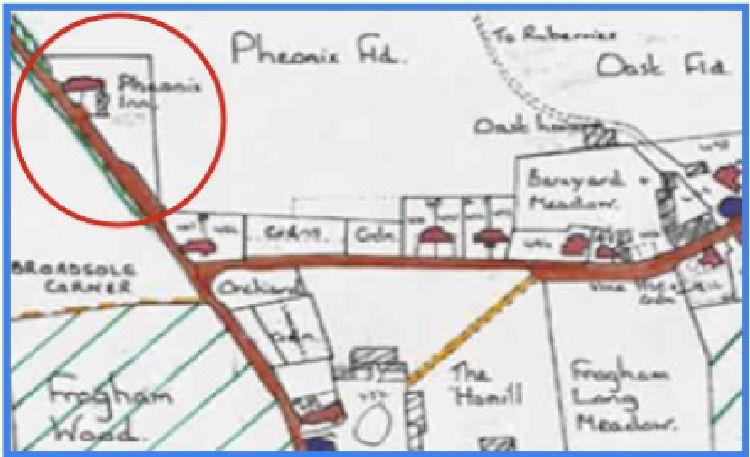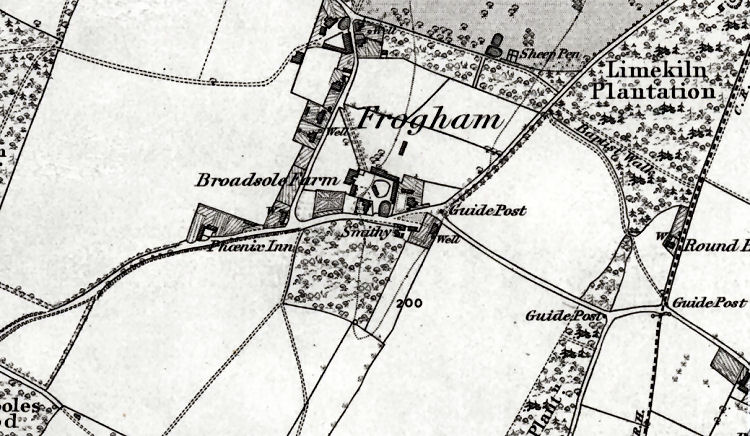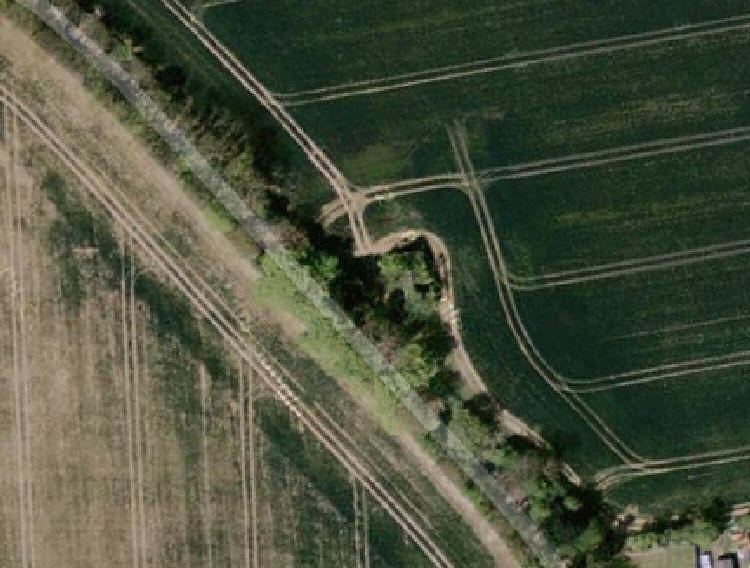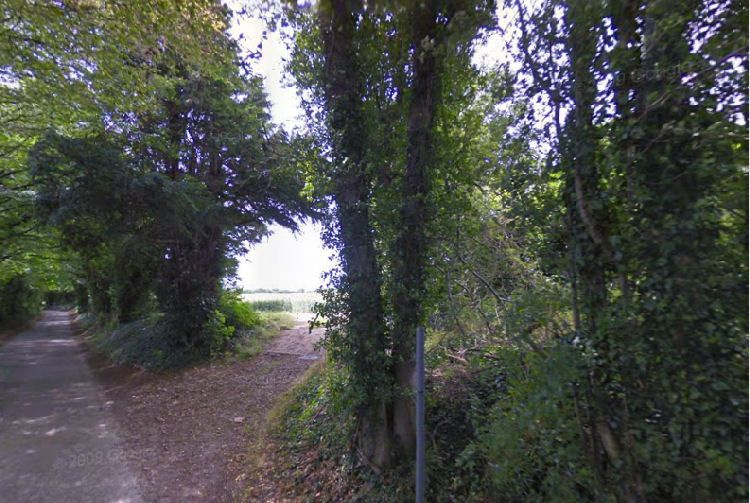|
The following information was kindly supplied by
Clive Webb, see following web site:-
https://www.nonington.org.uk
Originally called the "Red Lion" in 1833 the pub was renamed the
"Phoenix" although it was recorded on the 1839 parish tithe map under
its old name, as information for the map came from existing records and
not from an actual survey as with the 1859 map.
Licences were normally renewed or new ones issued in September at the Wingham
Division Licensing sessions in September but John Hopper's licence was
transferred to William Burville on November 1st 1836 indicating
something must have befallen him.
William Holloway became licensee in
1840 continuing until 1851 when his wife Anne, took over the licence
holding it until 1855.
Edward Allen became licensee in 1855 and during his tenure the
London, Chatham and Dover Railway line to Dover was built through the
parish, reaching Dover Town, now Dover Priory, station in July 1861, the
line was only a couple of hundred yards up the road from the alehouse
and obviously benefited greatly from the dozens of thirsty navvies
employed in its laying. The 1861 census lists the railway navies, mainly
single men, who lodged with households near to the railways route
through the parish from the hamlet of Ratling in the west of the parish
to the Phoenix at Frogham in the east, where some dozen or so men from
all over the country lodged. On nearby Three Barrows Down, to the
south-west of the alehouse, was a temporary shanty town where other
navies and their families lived whilst the line was built through this
part of the parish.
George Webb became licensee of the Phoenix in 1862 and was followed in
1870 by his wife who was succeeded in her turn in 1871 by a Mr. Bates,
who held the licence briefly, handing over in 1872 to Edwin Colthrup
whose son George took over the licence in 1875. George was to be the
last of the Phoenix's licensees as it ceased trading as licensed
premises in 1883.
After the alehouse closed the building was converted into two cottages,
known as Phoenix cottages, and were lived in until the late 1950's when
the cottages were demolished leaving only the outbuildings that can be
seen to this day.
On the 1839 parish tithe map the field directly across the road from the
old alehouse was known as Lyon Field, whilst to the rear (north) was
North Lyon Field, which by the time of the 1859 parish map become
Phoenix Field whilst Lyon Field still retains its pre-1839 name.
|
|
From the Dover Express and East Kent Intelligencer,
16 February, 1872. Price 1d.
ASSAULT ON A CONSTABLE
An agricultural labourer, answering to the name of Smith, who
described himself as an "Essex thrower," was charged with assaulting
Richard Bowden, a county constable, at Frogham, near Nonington, on the
22nd ult., while in the execution of his duty.
Mr. Minter appeared to prosecute, and, in opening the case, he stated
that the complainant had been on duty at a sale which took place at the
"Phoenix," Frogham, on the 22nd ult. The defendant was also there, in
company with three companions, who abused and made very personal remarks
about the complainant towards the close of the sale, the defendant
challenging the complainant to a wrestle; and on the complainant's
refusing to accept the challenge, the defendant came up stealthily
behind him and tripped him up, causing him to fall to the ground. The
complainant took no notice of this act at the time; but subsequently. in
consequence of some representation which had been made, he was called on
to send in his resignation; and now wished to vindicate himself from the
charge which had been made against him, of neglect of duty at the time
in question. He should call witness to prove that the defendant's
language throughout the day to the complainant was of a very improper
nature, and that the assault Smith committed was quite unprovoked. He
could also bring testimony before the Bench of the good character borne
by the complainant throughout Shepherdswell and the neighbourhood. He
called:
Richard Bowden, the complainant, who deposed: I have been a
constable in the Kent County Constabulary for about eight years. I have
been stationed at Shepherdswell for the past four years. On the 22nd of
January I was on duty at a sale, at the "Phoenis" public-house at
Frogham. I noticed the defendant there. He was in company of a man named
Maxted, and some others. He made some very offensive observations
of a personal nature to me during the afternoon. He was very drunk
indeed. He said, "Look at that policeman. He's no good; he wants a
knocking over." The defendant said he was "An Essex thrower," and could
throw me any day. Seeing that the defendant was drunk, I took no notice
of his observations. the defendant and Maxted were afterwards talking
about their measurement around the chest. The defendant and one of his
companions procured a piece of string, and wanted to measure me, and I
allowed them to do so. I afterwards heard them making a great noise
inside the bar of the "Phoenix." I was standing outside, some little
distance from the house. I was afterwards talking to Maxted, when the
defendant came up and said to him, "Here's a policeman for you." If he
wants to stand before a man let him stand before me." I moved away, and
I heard Maxted remonstrate with the defendant about interfering with me. He said I had not said anything to him, and that if he (the defendant)
persisted in annoying me, he (Maxted) would knock him down. The
defendant, however, moved away from Maxted and followed me. He crept
stealthily up behind me and tripped me down on the ground. I had a stick
at the time, and when I fell down it flew out of my hand and fell some
distance away. The defendant picked it up when I fell, and as I was
getting up he ran at me with it, trying to hit me. Maxted took the stick
away from the defendant, and then they both fell down together. Maxted
was also drunk. When Smith had the stick taken from him, he rushed at me
and tried to throw me down again; but I threw him down instead. I said I
should have the defendant locked up; and on my asking Maxted to assist
me, he said, "No, I shall stick to my mate." Maxted then dragged Smith
away from me. There was no one on the spot at the time by myself,
Maxted and the defendant. Two men named Sheath and Beer came up almost
immediately afterwards, and they all went into the public-house
together. This happened about three or four yards from the public-house
door. In was about nine in the evening. Smith presently came out and
said he knew he was to blame. He wanted me to make it up, but I told him
I should do no such thing. I had orders to remain at the public-house
from 12 o'clock, when the sale began, till eight or nine in the evening.
When the defendant and his friends had gone into the public-house, I
stood behind a tree till they came out. I think they came out at about a
quarter to ten. I distinctly heard one of the party say, "There are six
of us to one, and we can out-wear him. We can say that he challenged
you; and if he says he didn't, we can swear that he did." I went back to
Sheperdswell with Mr. Card, the landlord of the "White
Hall" public-house. I told the superior officer what had happened on
the following day. I have known property to be stolen at different sales
in the country like the one in question; and i was there to protect the
property, and see that no breach of the peace was committed.
By Major Munn: I was on duty at the sale in uniform. The defendant
was so drunk that he fell over a tub near the public-house door. I had a
staff with me when the defendant assaulted me; but I did not use it. I
am instructing constable of a section, and it is my duty to present at
any public assemblage that may take place within the district occupied
by my section.
By the defendant: I did not say that I could wrestle any man in
Nonington, neither did I say that I could put down any two or three men
in Nonington. You said you could throw me, if i would give you leave. I
did not speak to you much during the whole of the afternoon in question.
You came up behind me and tripped me up once; but you did not throw me
two or three times.
William Higgins: I was present at the sale which took place at the
"Phoenix" public-house, Frogham, of the afternoon of the 22nd ult. I
returned to Sherperdswell between six and seven in the evening. I
remember seeing the defendant at the sale, in company with Maxted and
some others, During the time I was there, both the defendant and his
companions behaved themselves very badly. All of them were the worse for
drink. I think they had some words together. The complainant was
perfectly sober during the time I remained at Frogham. I saw him
performing his duty up till half-past six. The complainant had borne an
excellent character among all the inhabitants of Shepherdswell, during
the four years I have known him to be stationed there.
By the defendant: I did not give the complainant any beer while I
remained at the sale, neither did I see him drinking any. My brother was
at Frogham on the afternoon in question, but I can swear he did not give
the complainant any beer.
Caleb Card deposed: I reside at the "White Hall" public-house, Shepherdswell. I attended the sale on the 22nd ult., at Frogham. I drove
there at about half-past eleven in the morning. I went away fro an hour
during the sale, but I returned again at about half-past one, and
remained till about half-past ten in the evening. I saw the complainant
there. He was sober and performing his duty in the proper manner. I did
not notice the defendant there. Bowden drove home with me in the
evening. He was perfectly sober then. I noticed that his clothes were
muddy, and I made a remark about it.
Henry Thomas Jacques: I was at Frogham on the 22nd ult. I did not see
the defendant during the sale; but I saw him in the evening after it was
all over, in company with a man called Maxted, and some others. When I
saw him then, he was standing in a room at the "Phoenix." While I was
there I heard one of the defendant's friends say that the complainant
was only a policeman, and that he aught to be knocked over.
By the defendant: Bowden was just going out of the door when I heard
the expression made. I did not see the complainant touch a glass of ale
all the time I remained there.
Charles Ratcliffe deposed: I am an auctioneer in partnership with Mr.
Sutton, and I reside at Womanswould. I had a sale at the "Phoenix"
public-house, at Frogham, on the 22nd ult. I saw the complainant there;
he was doing a constable's duty. He was quite sober during the whole of
the sale. The sale was over about five; and I then gave the complainant
a glass of ale. I saw the defendant just as I was going home. He seemed
to me to have been drinking pretty freely.
By the defendant: I did not see the complainant on the evening in
question after I had given him the glass of ale. He was drinking it
inside the public-house when I left Frogham. I did not know whether he
had any ale before I gave him the glass. He was perfectly sober when I
gave it to him.
Re-examined by Mr. Minter: I gave the complainant the ale because I
thought he had earned it.
This being the case for the prosecution.
The defendant said that at about nine on the evening of the day of
the sale, he heard the complainant and Maxted talking about wrestling. He heard the complainant say that he could throw any man in Nonington,
and that there were no two men in all Nonington who could put him down.
He (defendant) went up and challenged him, saying if the complainant
would give him leave, they would see about that. The complainant said.
"Come on, then." They then wrestled, and the complainant was thrown
twice in succession. The third time they wrestled they both fell down
together in the door porch of the public-house. The complainant got on
him, and after striking him several times in the chest, he called for
assistance, and wanted to take him into custody. No one would assist him
to handcuff me; and when they got up complainant said he should summons
him. He (defendant) asked him what he had done to be summonsed. He
finally promised the complainant that he would not say anything about
it, and they went to have some beer together.
Mr. Elsted: Were you drunk on the day of the sale?
The defendant: I wasn't what you call drunk, sir. In short, I wasn't
drunk and I wasn't sober. (Laughter.)
The defendant then called Maxted and the two other witnesses, who, on
being examined by him, bore out in a great measure the truth of his
statement; but on being cross-examined by Mr. Minter, the replies they
made were not at all satisfactory, the first witness Maxted, going so
far as to refuse replying to some of Mr. Minter's questions, while the
statement of two others of the defendant's friends, as to the time and
place of the wrestling, showed that they were not in a very clear state
of mind at the time of the occurrence, and were productive of much
amusement in Court.
Mr. Minter, at the conclusion of their examination, again addressed
the Bench at considerable length, criticising several weak points in the
evidence of the witnesses for the defence, and asked, with great
confidence, for a conviction.
The presiding Magistrate, after a short consultation, said that the
evidence of the three witnesses called in the defence differed so
entirely in many respects from each other that they were inclined to
discredit the defendant's statements altogether. He would be fined 30s.,
including the costs.
|
|
Dover Express 6 August 1937.
AYLESHAM. WEDDING OF MISS M. P. PREESE.
The wedding took place on Monday, at St. Peter's Church, of Miss
Margaret Phyllis Preese, only daughter of Mrs. Carpenter, of 30, Queen's
Rd., Aylesham, and the late Mr. Preese, to Mr. James Taylor, eldest son
of Mrs. Yendley, of Pheonix, Frogham, Nonnington, and the late Mr.
Taylor.
(I am unsure as yet whether the premises was
operating as a public house on this date.)
The Rev. A. E. O. Anderson officiated. The service was fully choral,
with Miss Boyle at the organ. The bride who was given away by her
step-brother, Mr. H. Carpenter, was attired in an ivory satin gown, with
veil and coronet of gardenias, white satin shoes, white silk gloves, and
carried a bouquet of white carnations. The bridesmaids were Miss Violet
Carpenter (step sister of the bride) and Miss Phyllis Leahy (cousin of
bride), who wore blue silk dresses trimmed with pink, with blue picture
hats, blue satin shoes and wore brooches, (the gifts of the bridesgroom).
Mr. H. Yendley was the best man, and a reception was held at the home of
the bride's parents.
|



